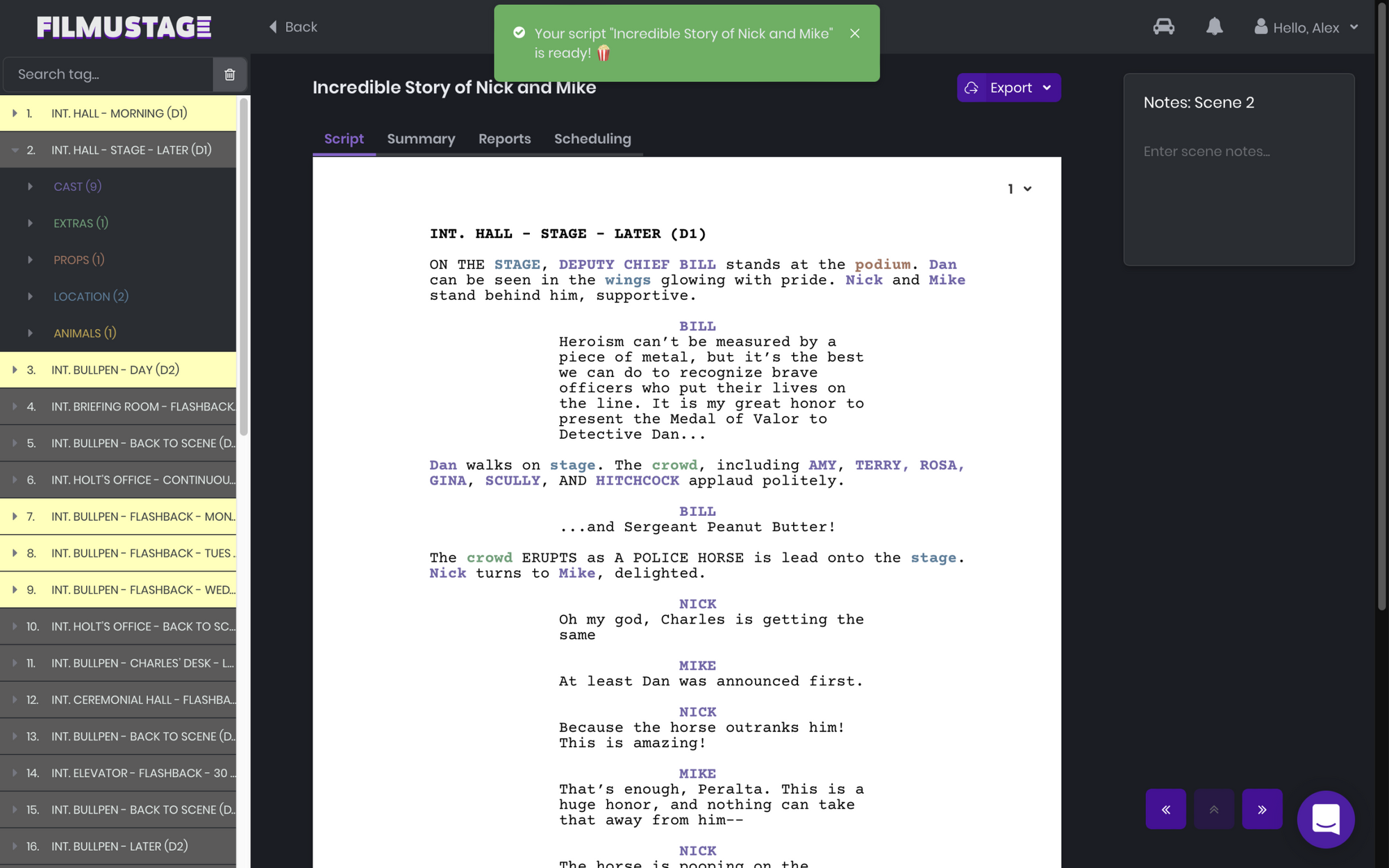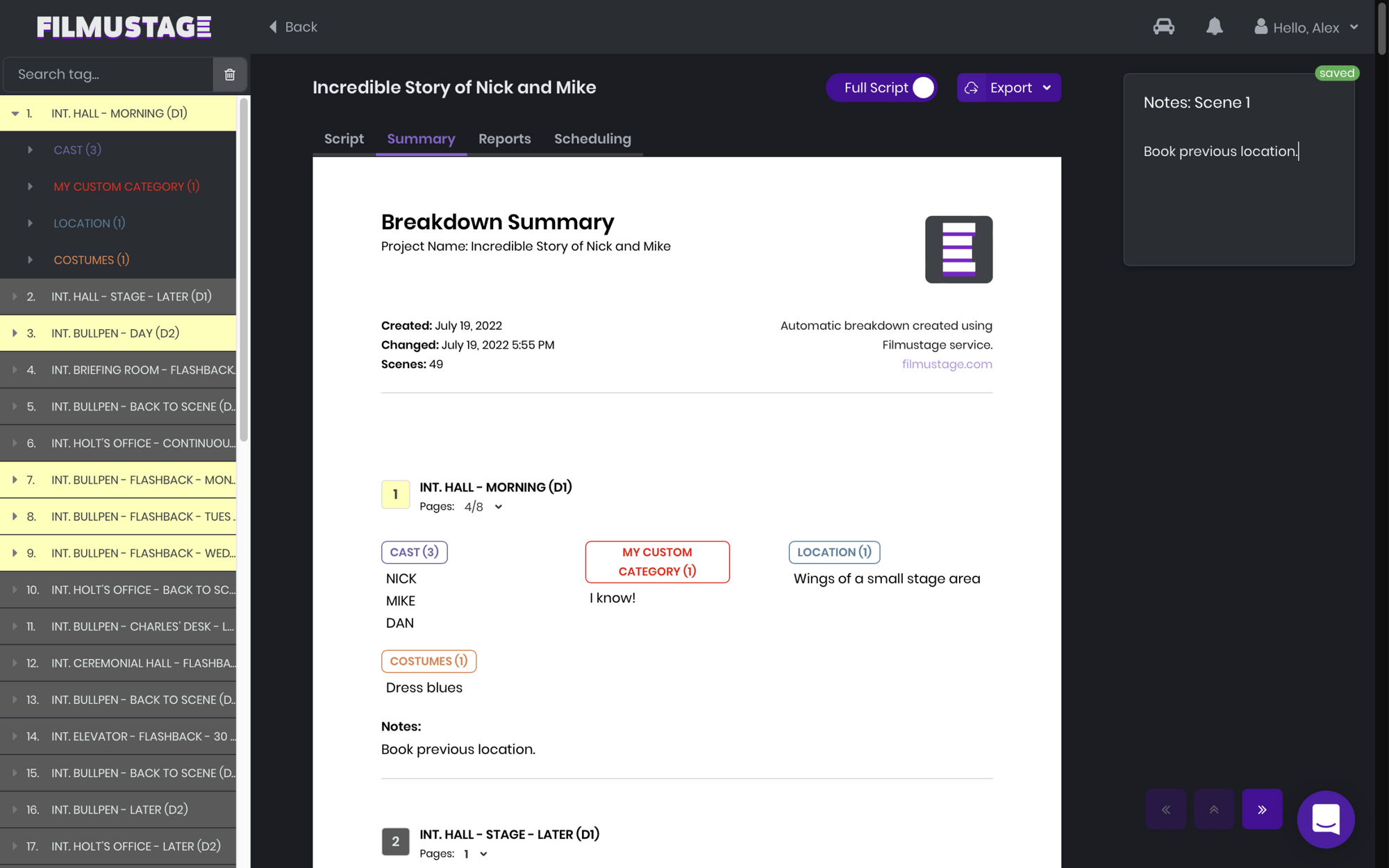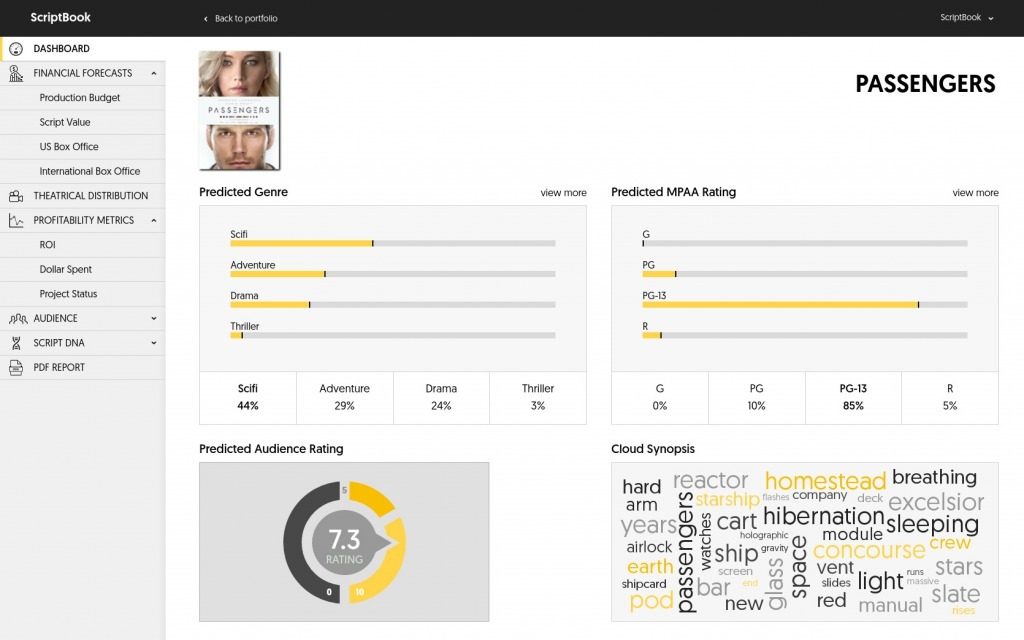How Artificial Intelligence tools change movies production
Can artificial intelligence become part of cinema? Hell, yes! We think this is a rhetorical question, and you'll find out why in our blog.


We can hardly imagine a more conservative industry than the film industry. For all its analogies, the process of filmmaking is endowed with many technological solutions that do not fit into the conventional framework at all. That's why it's funny how cinema has instilled in people a fear of artificial intelligence, and now it's actively incorporating these technologies into the production process of a film. The fact is that the future we were so afraid of has already arrived: AI is involved in the processes of filmmaking, and you can't even imagine how significant its influence is. Filmustage is interested in this kind of research and that's why we prepared material with examples of how machine learning helps people to create movies.
Pre-production: script, breakdown, and film production management
Every producer and director will tell you not to underestimate the script breakdown process because it determines the conditions in which your film will be made. It could either be chaos with budget overruns and missed deadlines, or it could be a well-organized workflow. At the moment, there are a lot of production management tools (you also may be interested in Top 7 Best film production management software 2022) that don't allow you to call the script breakdown process old-fashioned or non-technological. They have cloud synchronization and team access, but no one has tried to implement a neural network for this monotonous work. All right, we're lying, of course, since there is one contender.
Filmustage
Powered by artificial intelligence, Filmustage's algorithm can easily be called a true cinephile, since our machine learning has walked a lot of existing scripts, including many cult films. We set it up for constant learning and self-development. That's why you don't have to manually go through the screenplay to break down the movie script into essentials. Props, costumes, tag cast, locations, sound, visual FX, etc. - no crucial element will be missed.

Getting a script automatically broken down into elements in a couple of minutes is no longer a privilege, but a reality that fits into today's fast-paced world. So how does it work? It's very simple: upload a script in a format you're comfortable with, and voila! You'll get a beautifully parsed script that's ready for you to check and export. In addition to that, we offer automatically generated script reports, which instantly synchronize with every change in your screenplay. Remember that Filmustage doesn't do the work for you, but it assists, speeds up, and optimizes the process. Agree, it would be silly to try to replace the person in the line-producer role because then the profession would be dead, and only human beings are capable of solving stressful cases. So you can safely entrust the script management to us and not worry that you will lose control.

Scriptbook
Another interesting tool that tests the film industry through the art of AI is the Scriptbook. It can analyze scripts and give you the results of how much of a movie will succeed as a percentage. The neural network also takes into account the film's age rating as well as the gender bias in the script (i.e., whether the film passes the Bechdel test). For example, if such technology had been implemented in the 1980s, we would never have seen "Blade Runner" (1982), which was a box office flop but is considered a great movie many years later.

Here we encounter a dilemma since Scriptbook obviously targets stakeholders in the film industry to reform the business. By employing machine learning and natural language processing, Scriptbook has managed to create an abstract formula for a successful script - and that sounds extremely daunting. But technology is technology, and more films are likely to be selected by artificial intelligence in the future.
Benjamin
You may have heard of the short film "Zone Out" in 2018, directed by the mysterious Benjamin. The movie looked strange: ever-changing faces and voices - everyone wanted to know who created it. It turned out that the film's author was an artificial mind!
"Zone Out" was not the first film project for AI, but it has become the most mediatized. A team of LA enthusiasts created the short as part of the Sci-Fi London film festival. They fed the neural network thousands of hours of old black and white films, as well as a short performance by actor Thomas Middleditch on a green screen backdrop. From all this Benjamin first wrote the original screenplay and then acted, directed, and "shot" a film on his own.
If you're interested in seeing Benjamin's other work, you can check it out here. It is not clear how long it will take for artificial intelligence to create a full-length film, but we can already say that Benjamin's scripts are endowed with drama.
Post-production: VFX
Arraiy
Arraiy is a machine learning platform designed for visual effects in film and television. Think about it: no more green screens - now the crew can track CGI in real time without leaving the set.
Arraiy's developers are training a system that can independently separate certain parts of a frame from the background, such as an actor or a moving object. This process is called rotoscope and until recently was only done manually. The initial goal, of course, is to make the process faster and cheaper: an instant and accurate rotoscope will allow you to "try on" various visual effects using Unreal Engine (you may be interested in reading How to make movies in 2022: the set vs the screen) without leaving the monitor.
With this AI production management solution, filmmakers can fully immerse themselves in the fictional world of the film and make sure no detail is lost.
Deepfake
This one is controversial and ethically debatable, but it would be foolish to deny that technology itself is amazing. Deepfake is an environment in which the identity of one person in a video can be replaced by someone else. It uses machine learning algorithms to generate visual content based on someone else's face or voice. Namely, it analyzes every image or piece of the visual content of a particular person. You can try it yourself, as it is open-free to all, but we will not give direct links for ethical reasons.
For example, you could see how this technology works in Martin Scorsese's latest film to date, "The Irishman" (2018), where neural architectures were used to de-age Robert De Niro.
Afterword
"I never think of the future, it comes soon enough." - Albert Einstein
AI can be a useful companion, which will accelerate the work at each stage of production. Producers will find the use of trained neural networks for detailed pre-production: generate breakdown & script summary, budgeting, and shooting schedule. Directors will be able to fully commit to the creative process, even in CGI blockbusters, as highly advanced artificial intelligence allows them to track visual effects in real time. VFX supervisors and designers will have even more freedom to produce the most naturalistic models and landscapes. Filmmaking has already changed, thanks to the latest AI implementations – and we're sure the revolution is far from over. It is important to keep dreaming and developing artificial intelligence based services further, that is the only way we can open up new possibilities for the film industry.